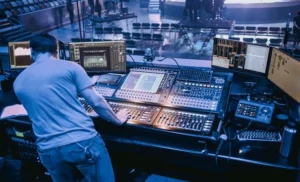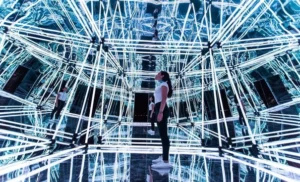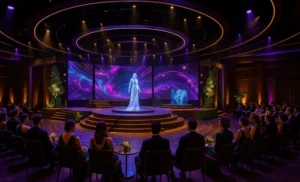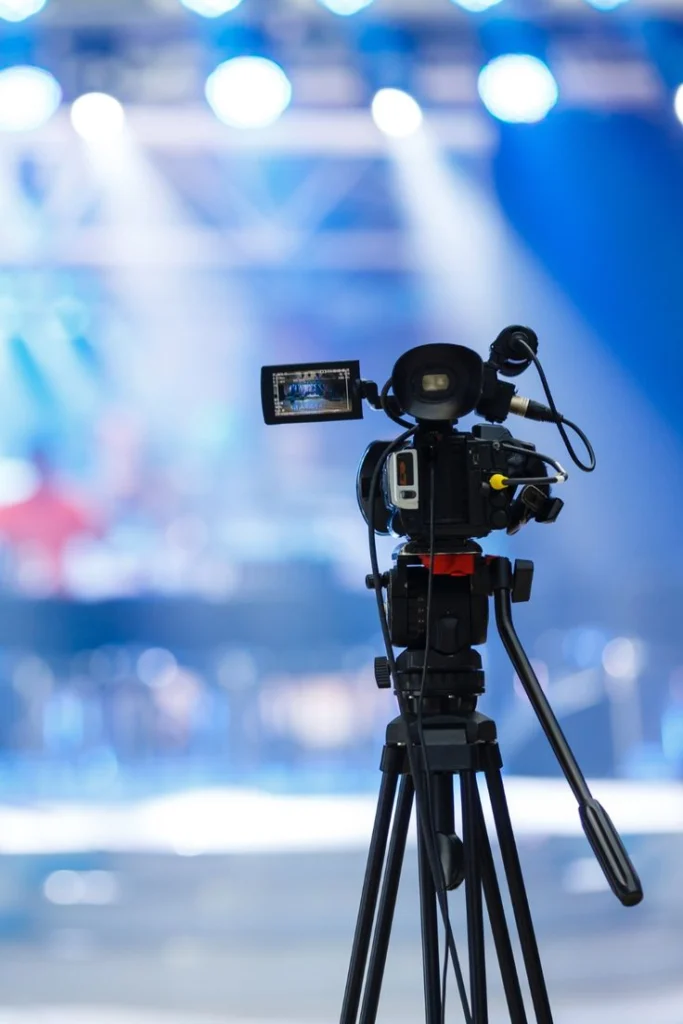
What’s the difference between an average event and one that makes jaws drop? It’s the technical event production.
You can book the fanciest venue, line up world-class speakers, and have a killer guest list.
But…. if the mic dies or the screens freeze during your CEO’s big reveal? That’s the kind of “memory” nobody wants, trust me!
Because here’s a harsh reality: The success of your event lives or dies by its technical production.
So, if you don’t want to deal with those horrifying tech mishaps, keep reading.
We’re about to uncover everything you need to know: from what technical production actually involves, to how it works, who are the real pros of event technical production?
And what you can learn from their wins (and mistakes) to make your event successful & memorable!
What Is Technical Event Production?
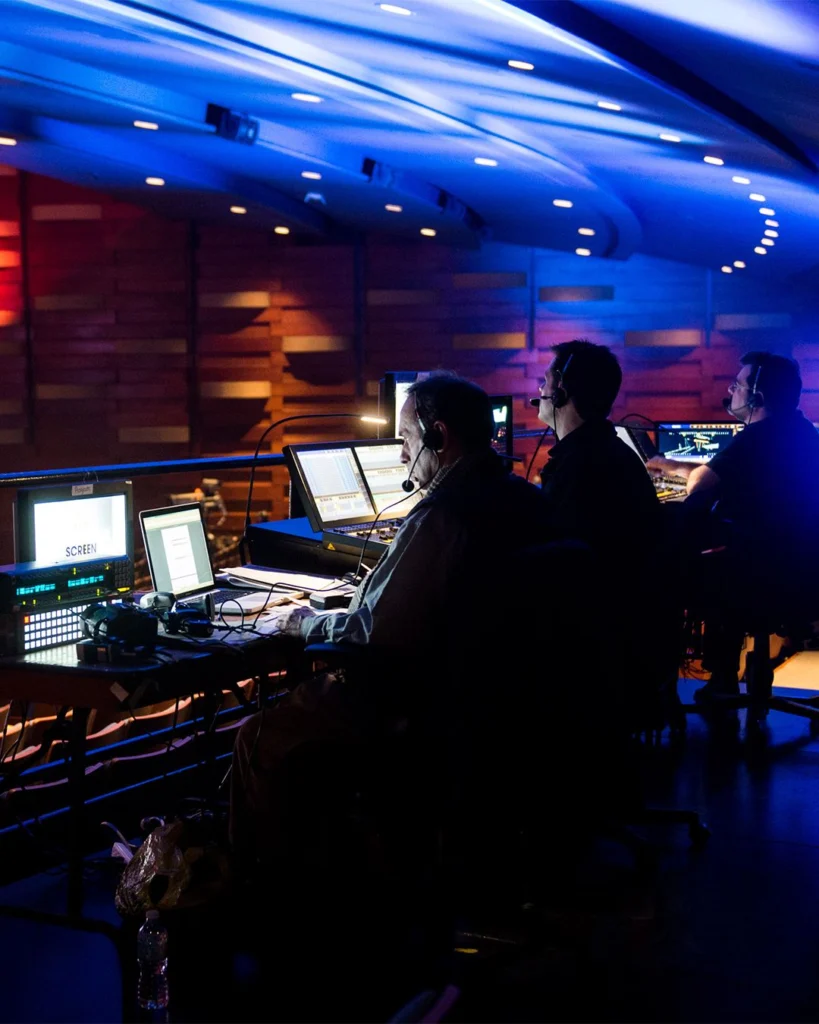
Image Courtesy Pinterest
Technical event production is everything that makes your event function on a technical level, including the lighting, the sound, the video, the stage, and the power.
All the elements that transform a plain venue into a smooth experience.
It starts before the first guest arrives and continues long after the last chair is packed away. In simpler terms:
- It’s the crew behind the AV desk who make sure your CEO’s mic is hot the second they walk on stage.
- It’s the people who hang lights so the dinner looks dreamy, not like a cafeteria.
- It’s the technicians who test every cable, run rehearsals, and make sure your LED wall doesn’t freeze mid-presentation.
It’s not just gear. It’s coordination, communication, and a whole lot of planning. And for corporate events, where expectations are sky-high and there’s no room for surprises, it’s non-negotiable.
GC Event Studio – Your Go-To Technical Event Production Partner

Spending money on everything else instead of hiring a solid technical production company is a recipe for a failed event.
So, if you’re planning any corporate event, choose a technical production company that’s engineered to support the full scope of your event—strategically, seamlessly, and with zero guesswork.
But not all production teams operate at the same level. Some simply deliver the gear and hope for the best.
So, to save you the headache, we’ve rounded up some top-tier names you’ll definitely want to keep on your radar.
What Makes GC Event Studio Stand Out?

If you’re aiming for a tech-savvy event that really wows, GC Event Studio in Los Angeles should be on your radar.
Whether you’re planning a corporate gig, a slick product launch, or a private celebration, they dive into every project with a sharp eye for detail and a serious commitment to making it excellent.
What’s their specialization? Their lineup includes everything from advanced photo booth experiences, think glam, 360 video, green screen, roaming booths, and even enclosed setups, to cinematic event photography and videography that complements any Corporate Event Production.
On top of that, they offer professional DJ entertainment, mood-setting lighting design, eye-catching LED wall installations, and even customizable dance floors if you want to get everyone moving.
Basically, if you want your event to feel modern, fun, and effortlessly cool, GC Event Studio’s got you covered.
Moreover, they are also trusted by global powerhouses like Netflix, Amazon Prime, and the NFL for delivering events that resonate, connect, and inspire.
What Technical Event Production Services Should You Be Looking For?
When you’re planning a live event, especially a corporate one where everything needs to run like clockwork, it’s not about the sizzle. It’s about what happens behind the scenes.
You need a tech partner who knows what they’re doing and offers a full range of services that go way beyond plugging in mics and projectors.
Here’s what you should look for when choosing a technical event production company:
1. Professional Audio-Visual (AV) Setup
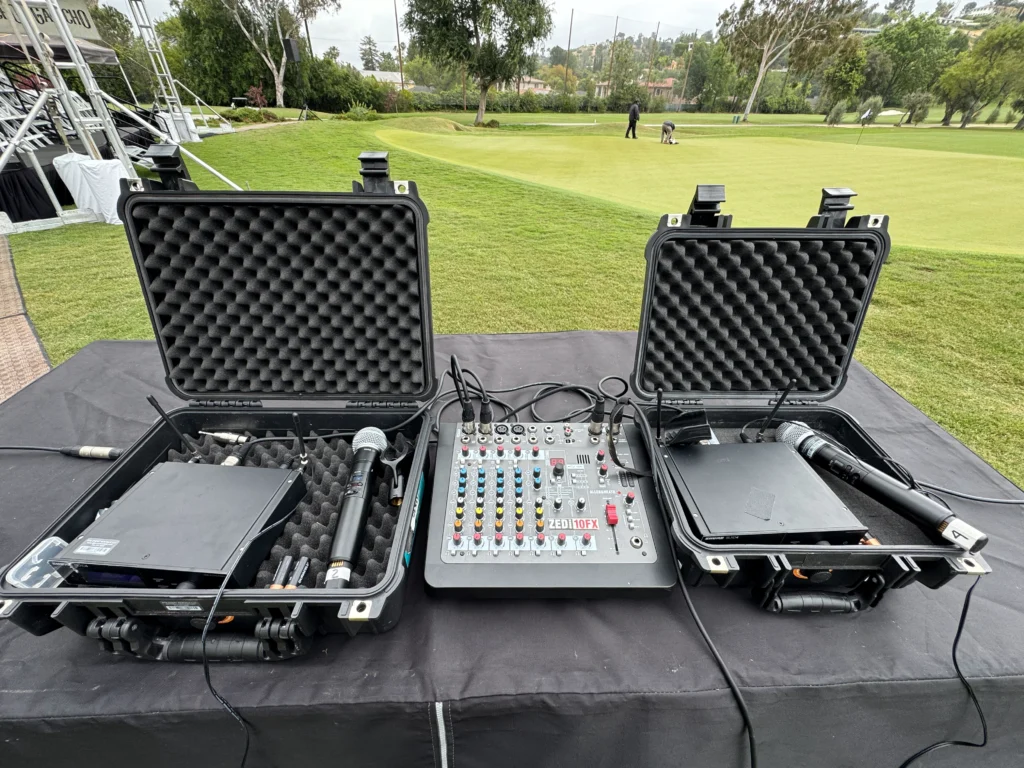
Crystal-clear sound and sharp visuals are non-negotiable technical production services.
Whether it’s a keynote, a panel discussion, or a product launch, your AV setup absolutely has to be flawless.
Nobody wants a wireless mic that drops out mid-sentence or screens so dim you’re squinting like you forgot your glasses. And let’s be real, video feeds that lag? Yeah, that’s an instant vibe killer.
Here’s what you really want to keep an eye out for:
- High-end speakers and pro-grade mixers — because crisp, clear sound isn’t just nice, it’s essential, as your audience deserves to hear every word and every note perfectly.
- HD or 4K projectors and LED video walls — these bad boys make sure your visuals pop, whether it’s branded content, slick slideshows, or live demos. Bright, sharp, and totally binge-worthy.
- Multi-camera setups — perfect for capturing all the angles, especially if you’re doing a hybrid event or want slick footage for after the show. Think smooth live feeds and killer post-event videos.
- Reliable mic setups — for panels, speakers, and those all-important audience Q&As. Seamless sound means everyone gets heard, no awkward tech hiccups.
2. Live Streaming & Hybrid Capabilities
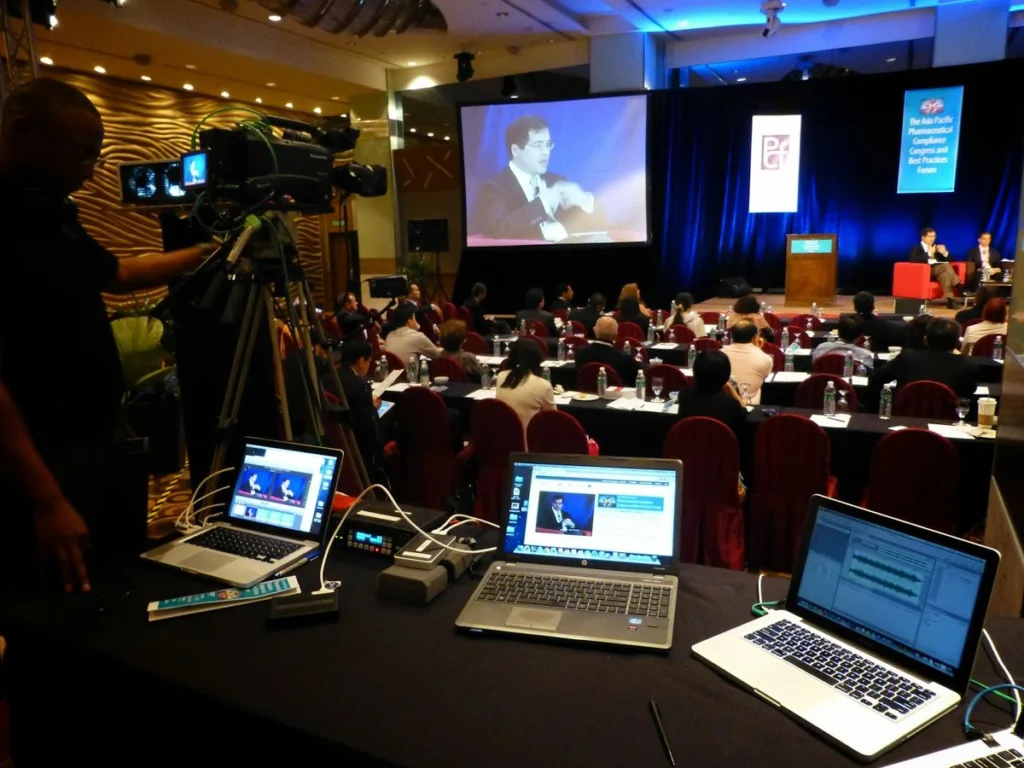
Image Courtesy Pinterest
In today’s world, most of the corporate events are going hybrid.
You need a production company that knows how to deliver an experience to people in the room and at home, “ at the same time” without glitches or delays.
Look for teams that can:
- Stream in real time across multiple platforms (Zoom, YouTube, Teams, etc.)
- Manage multiple camera angles for an engaging virtual view
- Integrate live audience interaction (chat, polls, Q&A)
- Handle backups, because if the internet drops, you want Plan B ready
3. Stage Design & Scenic Setup
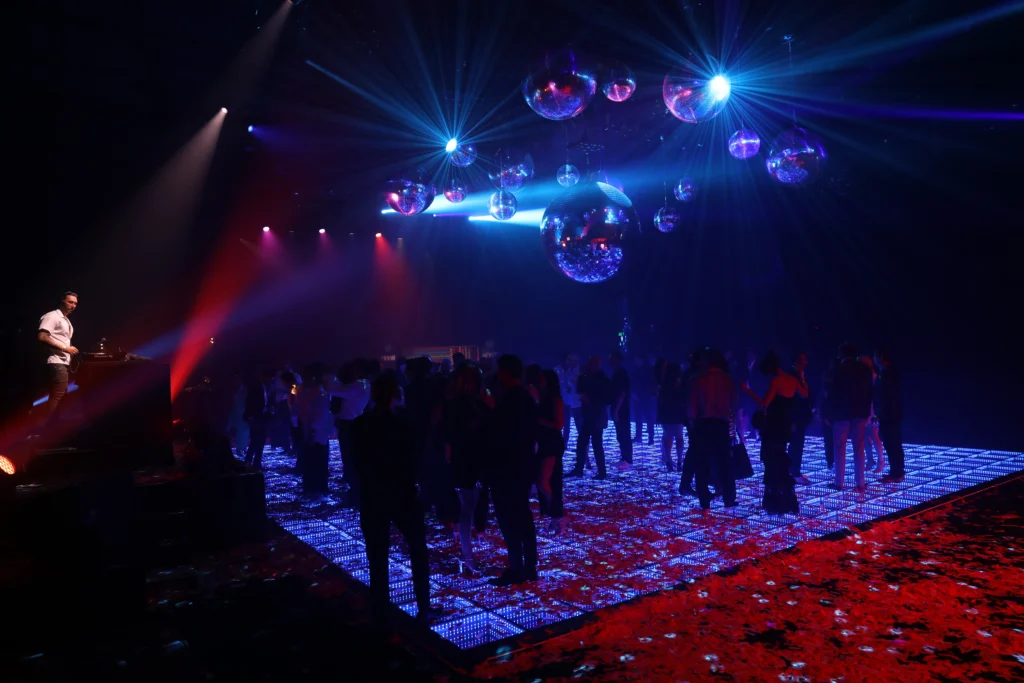
Stage design is the first thing your guests will notice and honestly, one of the most overlooked parts when planning event production.
If you’re vetting technical event production services, here’s what you really want to ask when it comes to stage design and scenic setup:
- Can they build a story, not just a stage?
It’s not just about platforms and panels. A quality team transforms the stage into an immersive environment that supports the theme and engages the audience, whether it’s a minimalist brand reveal or a fully loaded LED dance floor. - Do they offer custom scenic elements?
Branded backdrops, layered textures, dimensional props—these aren’t extras, they’re essentials. Check if the provider includes custom event design and build services as part of their production package. - What’s the lighting integration like?
A stage setup is incomplete without mesmerising event lighting services. Your scenic setup literally shines when synced with advanced lighting. - Is the setup flexible and scalable?
The scenic system should be modular enough to pivot without compromising aesthetics. Reliable technical production management should make that part seamless. - Can they show you a 3D rendering before build-out?
If not, keep looking. Providers offering event visualization and planning will help avoid surprises and keep creative and logistics aligned.
4. Lighting Design That Tells a Story

Image Courtesy Pinterest
Lighting is one of the most underrated parts of any event, until it’s bad. If you’re planning a fun and entertaining corporate event, lighting becomes the limelight of the entire experience.
Good lighting doesn’t just make your stage look great. It sets the tone, highlights the right moments, and creates atmosphere.
A top-tier company will offer:
- Intelligent lighting that changes with the mood
- Uplighting, spotlights, and ambient effects
- Synchronization with music and transitions
- Custom lighting scenes for different parts of the event
5. Technical Direction & On-Site Show Management
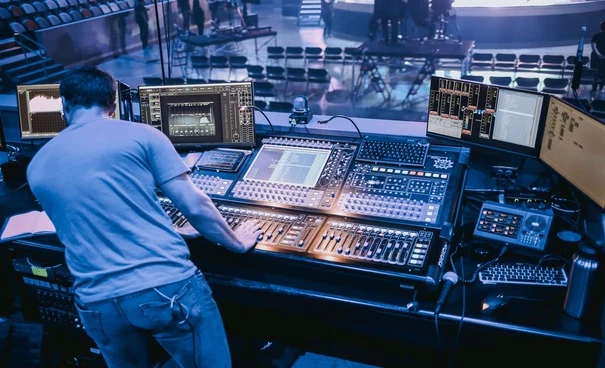
Image Courtesy Pinterest
Even the best-laid plans need real-time coordination.
A solid production partner should provide a seasoned technical director who calls cues, solves problems, and ensures everything runs smoothly minute by minute.
This person is the unsung hero who keeps your show on track and your speakers at ease. If a light misfires or a mic dies, they’ve already fixed it before you notice.
6. Pre-Production Planning & Venue Walkthroughs
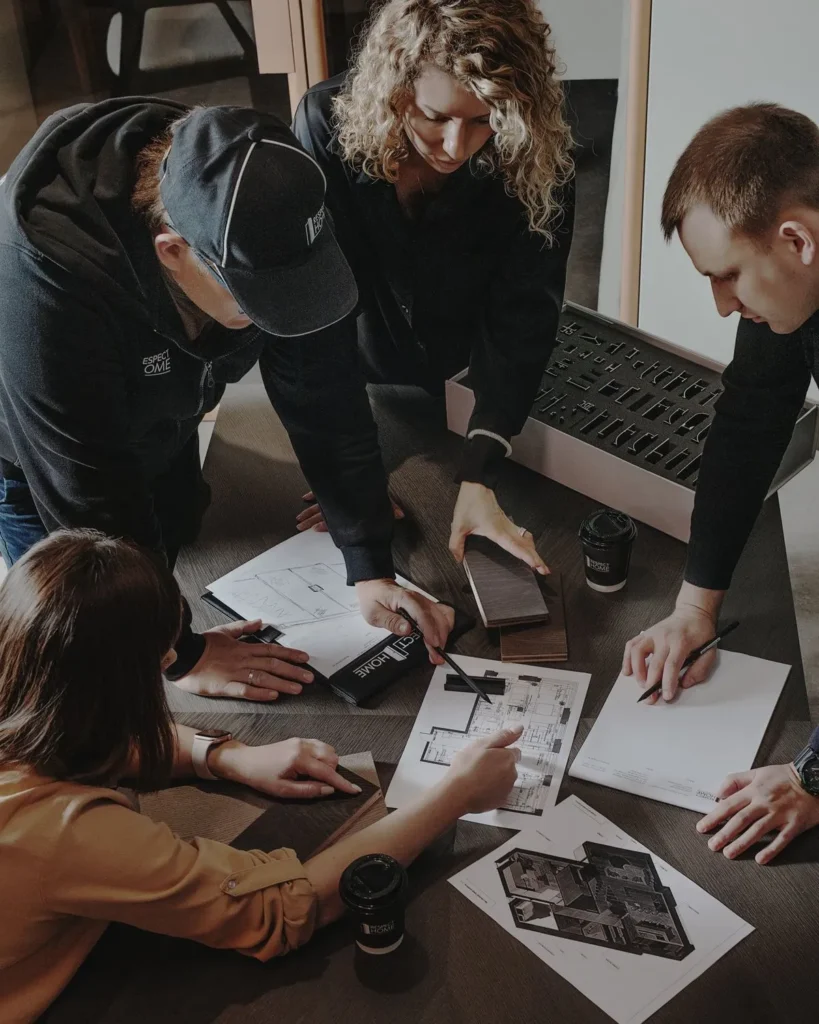
Image Courtesy Pinterest
A company that’s serious about your success doesn’t just show up on the event day, they’re involved from day one.
That means site visits, gear specs, power mapping, logistics, all the behind-the-scenes magic that ensures zero surprises.
You want a partner who:
- Pre-event site visits to understand layout, lighting conditions, acoustics, and potential tech challenges before show day.
- Seamless coordination with your event planner and venue staff to ensure AV, staging, power access, and timing all align.
- Full system testing in advance, so everything from sound to screens is dialed in before doors open.
- A solid contingency plan for every possible hiccup, like mic failures, power outages, or internet drops, so you’re never caught off guard.
7. Event Recording & Post-Production

The value of your event shouldn’t stop when the lights go down.
A skilled technical production partner can capture every moment, recording the event in high-definition and editing the footage to match your brand’s standards.
Whether you’re repurposing content for internal training, promotional reels, or public replay, professional videography and event photography extend your event’s lifespan and ROI.
Even better? When your tech team can transform key moments into short, social-ready clips, because today, your audience lives online.
8. AI Integration
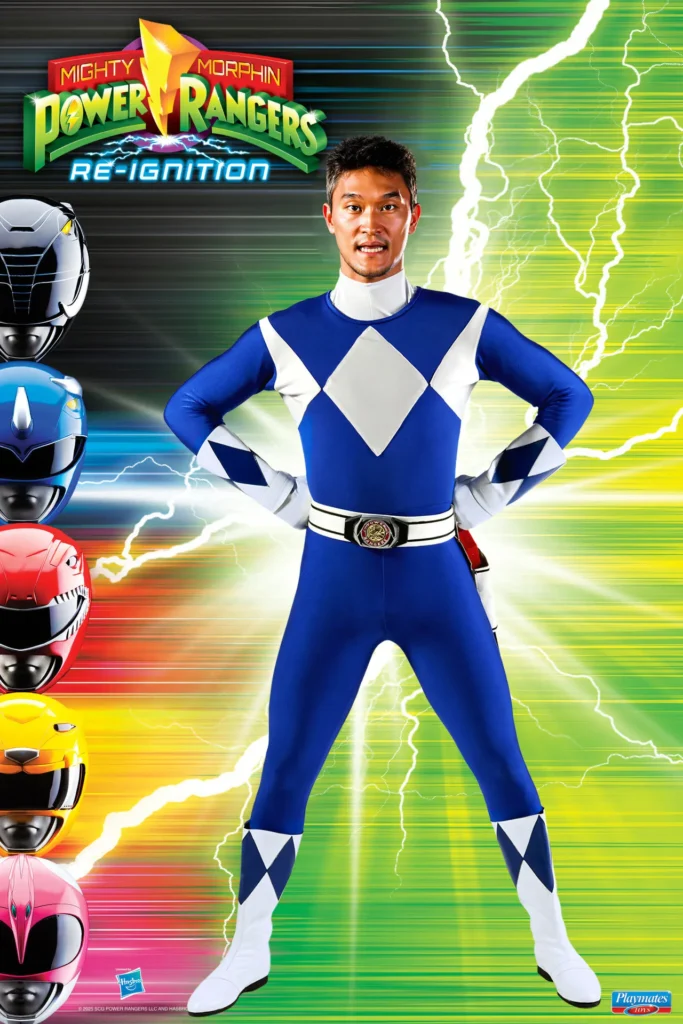
AI is becoming the quiet powerhouse of modern event production. It’s not just hype—it’s reshaping how events run behind the scenes and on the main stage.
Here’s how:
- Smart lighting systems that auto-adjust to match the vibe in the room—whether it’s high energy or soft ambiance.
- Facial recognition check-ins that move guests through faster, without the awkward bottlenecks at registration.
- AI-powered experiences like the AI Photo Booth that personalize every shot with real-time enhancements, dynamic filters, and seamless interactivity.
- Live data tracking that shows what’s working (and what’s not) while the event is still happening—so teams can pivot in real time.
- Camera automation that adjusts angles based on stage movement, capturing the best shots without missing a beat.
So, when you’re talking to a production company, ask them how they’re using AI—not because it sounds fancy, but because it genuinely makes the experience smoother, smarter, and a whole lot less stressful on show day.
Pro Tips To Run a Successful Technical Event (Checklist)
Keep this checklist close if you really want to run a smooth and successful event (or just want to avoid the nightmare of mid-show tech failures). These are the small moves that make a big difference.
Pre-Event Planning

Image Courtesy Pinterest
- Set Strategic Objectives: Define clear, outcome-driven goals that shape every planning decision—from programming to tech setup. Knowing your “why” helps everything else fall into place.
- Build a Resilient Budget: Plan your budget down to the last cable—then give yourself a cushion. Technical events often come with last-minute pivots, and preparation ensures confidence, not compromise.
- Choose a Venue that Works as Hard as You Do: Your space should elevate the experience, not limit it. Prioritize locations that support your tech specs, guest flow, and branding potential.
- Curate a Pro-Level Vendor Team: Work with vendors who don’t just show up—they show out. Seek out experienced partners who understand tight timelines, high production standards, and the stakes of live events.
Technical Setup
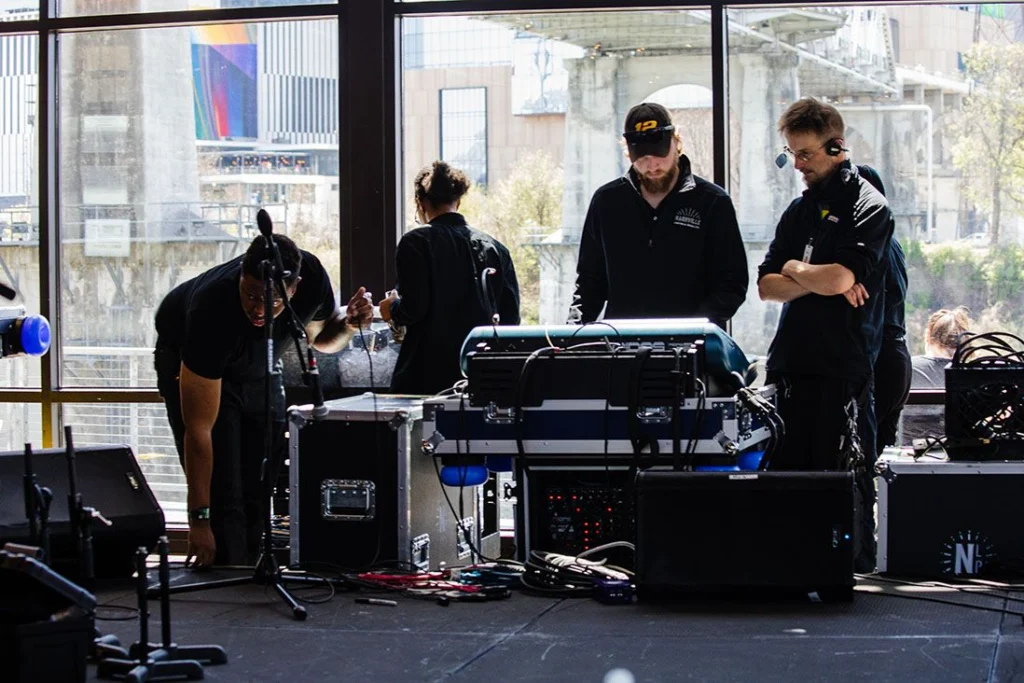
Image Courtesy Pinterest
- Conduct a Full Technical Rehearsal: Run through all technical aspects of the event to identify and resolve issues beforehand.
- Equipment Readiness: Verify that all AV equipment is functioning properly and have backups available.
- Assess Venue Capabilities: Confirm that the venue can support your technical setup, including power requirements and internet connectivity.
- Prepare a Show Flow Document: Create a detailed schedule outlining every segment, cue, and technical requirement.
Team Coordination

Image Courtesy Pinterest
- Assign a Dedicated Technical Manager: Designate someone to oversee all technical aspects and coordinate with vendors and the venue.
- Brief the Team Thoroughly: Make sure all team members understand their roles and the event timeline.
- Establish Communication Protocols: Set up reliable communication channels like radios or headsets in order to have a smooth coordination during the event.
Logistics and Contingency
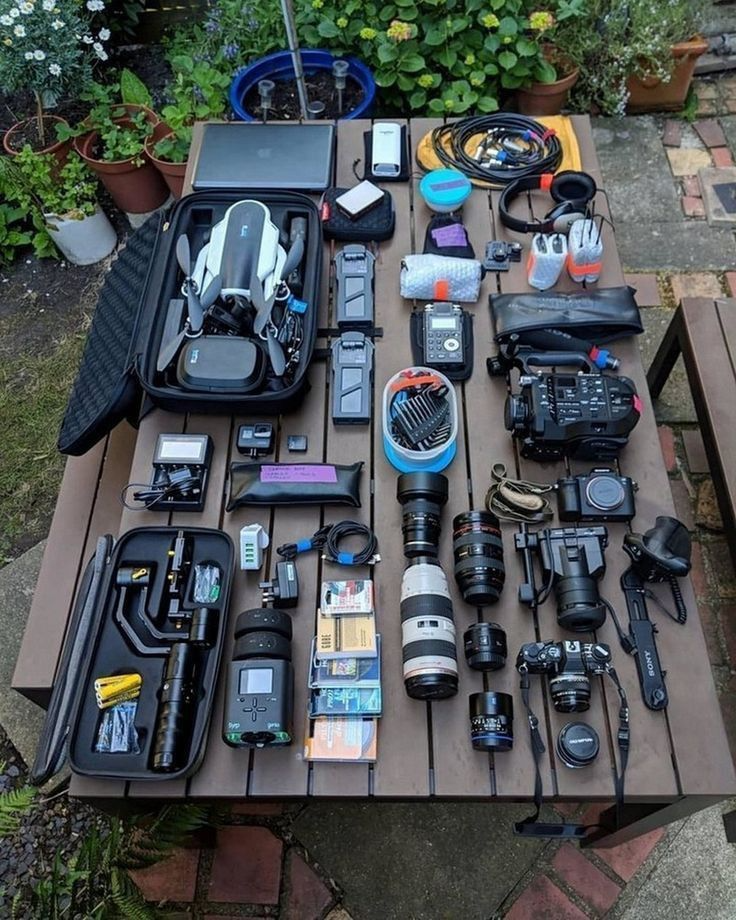
Image Courtesy Pinterest
- Prepare for Equipment Failures: Must have spare cables, batteries, and other essential items on hand to address any technical issues promptly.
- Manage Time Effectively: Allocate sufficient time for setup, rehearsals, and troubleshooting to avoid last-minute rushes.
- Plan for Post-Event Teardown: Organize the dismantling process to make sure your equipment is packed safely and the venue is left in good condition.
Wrapping It Up!
Technical event production isn’t just some checklist of cables and consoles. It’s the heart of your event’s atmosphere, timing, and overall experience.
You don’t need to be a tech expert yourself, you just need the right people in your corner.
A solid production partner will see problems before they happen, speak the language of AV without losing you in jargon, and keep your event moving with confidence and clarity.
So, if you’re looking for that kind of trusted experience? GC Event Studio has been quietly helping brands pull off seamless tech productions for years.
Consult now to make your event run flawlessly!
Frequently Asked Questions
What is technical event production, really?
It’s everything behind the curtain: the sound, lighting, video, staging, live streaming, all working together to make your event actually feel seamless.
How early should I book a technical production team?
As soon as you have a date and venue locked in, start the convo. Good teams book out fast, especially in peak seasons.
What kind of equipment do they usually bring?
They’ll typically handle all the gear: audio rigs, lighting systems, LED walls, cameras, streaming tools.
Can they handle hybrid or fully virtual events too?
Yep, most evolved their services post-2020 to include pro live streaming, virtual studio setups, and real-time support for remote audiences. You don’t have to figure out the tech alone.
How much does all this typically cost?
It depends on your needs, number of rooms, gear required, crew size, show complexity.

